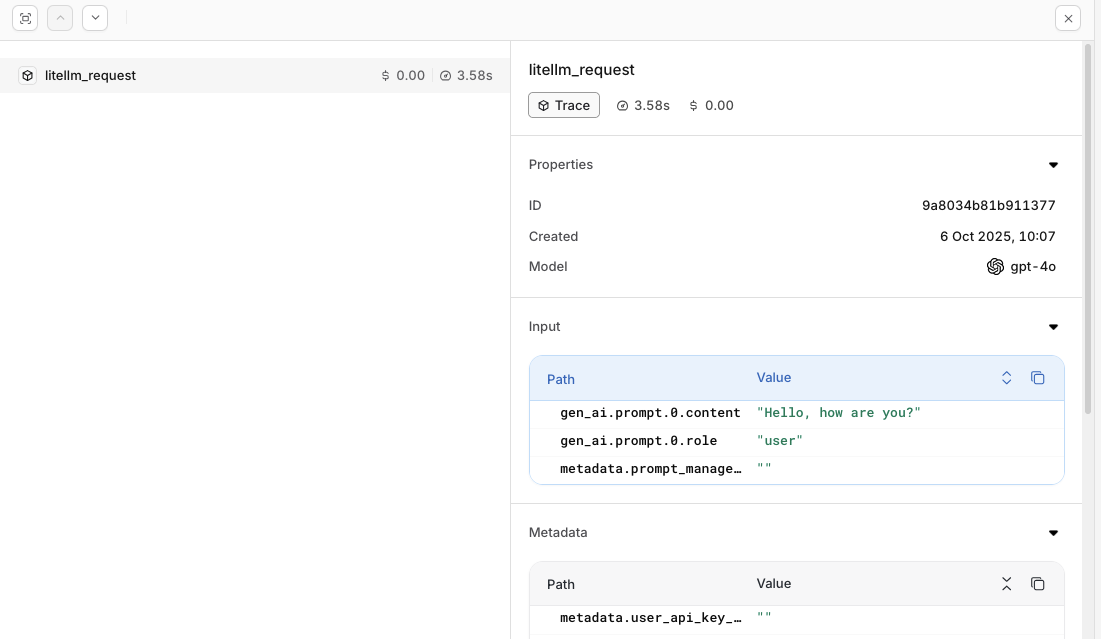LiteLLM
Integrate Orq.ai with LiteLLM using OpenTelemetry
Getting Started
LiteLLM provides a unified interface for multiple LLM providers, enabling seamless switching between OpenAI, Anthropic, Cohere, and 100+ other providers. Tracing LiteLLM with Orq.ai gives you comprehensive insights into provider performance, cost optimization, routing decisions, and API reliability across your multi-provider setup.
Prerequisites
Before you begin, ensure you have:
- An Orq.ai account and API Key
- LiteLLM installed in your project
- Python 3.8+
- API keys for your LLM providers (OpenAI, Anthropic, Cohere, etc.)
Install Dependencies
# Core LiteLLM and OpenTelemetry packages
pip install litellm opentelemetry-sdk opentelemetry-exporter-otlp
pip install 'litellm[proxy]'
Configure Orq.ai
Set up your environment variables to connect to Orq.ai's OpenTelemetry collector:
Unix/Linux/macOS:
export OTEL_EXPORTER_OTLP_ENDPOINT="https://api.orq.ai/v2/otel/v1/traces"
export OTEL_EXPORTER_OTLP_HEADERS="Authorization=Bearer <ORQ_API_KEY>"
export OTEL_RESOURCE_ATTRIBUTES="service.name=litellm-app,service.version=1.0.0"
export OPENAI_API_KEY="<YOUR_OPENAI_API_KEY>"Windows (PowerShell):
$env:OTEL_EXPORTER_OTLP_ENDPOINT = "https://api.orq.ai/v2/otel/v1/traces"
$env:OTEL_EXPORTER_OTLP_HEADERS = "Authorization=Bearer <ORQ_API_KEY>"
$env:OTEL_RESOURCE_ATTRIBUTES = "service.name=litellm-app,service.version=1.0.0"
$env:OPENAI_API_KEY = "<YOUR_OPENAI_API_KEY>"Using .env file:
OTEL_EXPORTER_OTLP_ENDPOINT=https://api.orq.ai/v2/otel/v1/traces
OTEL_EXPORTER_OTLP_HEADERS=Authorization=Bearer <ORQ_API_KEY>
OTEL_RESOURCE_ATTRIBUTES=service.name=litellm-app,service.version=1.0.0
OPENAI_API_KEY=<YOUR_OPENAI_API_KEY>Integrations
Choose your preferred OpenTelemetry framework for collecting traces:
LiteLLM
Auto-instrumentation with minimal setup:
import litellm
# Use just 1 line of code, to instantly log your LLM responses across all providers with OpenTelemetry:
litellm.callbacks = ["otel"]
# Your LiteLLM code is automatically traced
response = litellm.completion(
model="gpt-4o",
messages=[{"role": "user", "content": "Hello, how are you?"}]
)
print(response.choices[0].message.content)Examples
Basic Multi-Provider Usage
import litellm
# Use just 1 line of code, to instantly log your LLM responses across all providers with OpenTelemetry:
litellm.callbacks = ["otel"]
def basic_multi_provider_example():
# Define different models from various providers
models = [
"gpt-4", # OpenAI
"claude-3-opus-20240229", # Anthropic
"command-nightly", # Cohere
"gemini-pro", # Google
"llama-2-70b-chat", # Meta (via Replicate)
]
prompt = "Explain the benefits of microservices architecture in 2 sentences."
results = []
for model in models:
try:
print(f"Testing {model}...")
response = litellm.completion(
model=model,
messages=[{"role": "user", "content": prompt}],
max_tokens=150,
temperature=0.7
)
results.append({
"model": model,
"content": response.choices[0].message.content,
"tokens": response.usage.total_tokens,
"cost": response.usage.total_tokens * 0.002 # Estimated cost
})
except Exception as e:
print(f"Error with {model}: {e}")
results.append({
"model": model,
"error": str(e)
})
return results
results = basic_multi_provider_example()
for result in results:
if "error" not in result:
print(f"{result['model']}: {result['tokens']} tokens, ~${result['cost']:.4f}")Cost Optimization with Provider Fallback
import openlit
import litellm
from typing import List, Dict, Any
# Use just 1 line of code, to instantly log your LLM responses across all providers with OpenTelemetry:
litellm.callbacks = ["otel"]
def cost_optimized_completion(
messages: List[Dict[str, str]],
fallback_models: List[str] = None,
max_tokens: int = 100
) -> Dict[str, Any]:
"""
Try models in order of cost efficiency with fallback options
"""
if fallback_models is None:
fallback_models = [
"gpt-3.5-turbo", # Cheapest OpenAI option
"claude-3-haiku-20240307", # Anthropic's fastest/cheapest
"command", # Cohere
"gpt-4o-mini", # OpenAI's smaller model
"gpt-4", # Fallback to premium if needed
]
for i, model in enumerate(fallback_models):
try:
print(f"Attempting {model} (priority {i+1})...")
response = litellm.completion(
model=model,
messages=messages,
max_tokens=max_tokens,
temperature=0.7
)
# Calculate approximate cost (rough estimates)
cost_per_1k_tokens = {
"gpt-3.5-turbo": 0.002,
"gpt-4o-mini": 0.0015,
"gpt-4": 0.03,
"claude-3-haiku-20240307": 0.00025,
"claude-3-sonnet-20240229": 0.003,
"command": 0.015
}
estimated_cost = (response.usage.total_tokens / 1000) * cost_per_1k_tokens.get(model, 0.002)
return {
"success": True,
"model_used": model,
"content": response.choices[0].message.content,
"tokens": response.usage.total_tokens,
"estimated_cost": estimated_cost,
"attempt_number": i + 1
}
except Exception as e:
print(f"Failed with {model}: {e}")
if i == len(fallback_models) - 1: # Last attempt
return {
"success": False,
"error": f"All models failed. Last error: {e}",
"attempts": len(fallback_models)
}
continue
return {"success": False, "error": "No models available"}
# Test cost optimization
result = cost_optimized_completion([
{"role": "user", "content": "Summarize the key benefits of using Docker containers for development"}
])
if result["success"]:
print(f"Success with {result['model_used']} on attempt {result['attempt_number']}")
print(f"Cost: ~${result['estimated_cost']:.4f}, Tokens: {result['tokens']}")
print(f"Response: {result['content'][:100]}...")View Traces
Head to the Traces tab to view LiteLLM traces in the Orq.ai Studio.

Updated 20 days ago